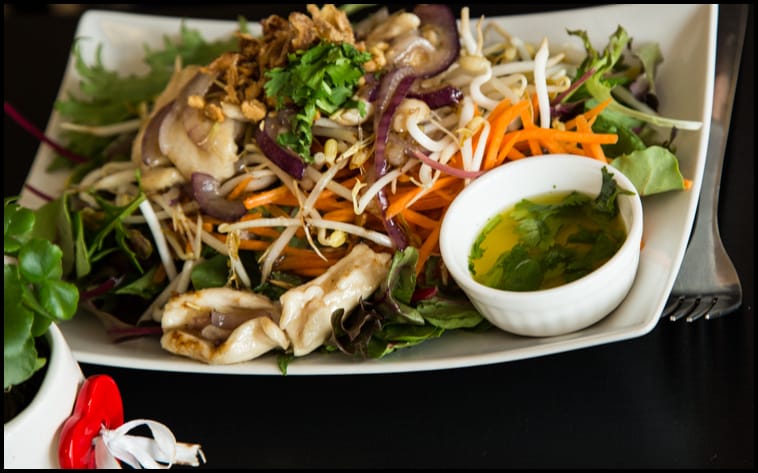What’s the best way to tell area residents about plans for a new asylum shelter nearby?
The government should tell communities directly about plans for new asylum shelters, some activists and politicians say.
Over lunch at HX46, Councillor Mary Freehill talks about how she got into politics, water-charge protestors, Dublin’s housing shortage, and her future.

As I sit across from Councillor Mary Freehill in the small-but-bright lunch venue, it is clear that she knows a sizeable number of the other diners.
She had offered to make us lunch in her office, just around the corner, but we opted instead for one of her regular haunts: HX46.
Named after its location on Harold’s Cross Road, a couple minutes south of the canal, HX46 is a cross between a tea-and-cake café and an Asian restaurant that does home deliveries in the evening.
The counter is lined with golden pastries and behind them the kitchen is disguised by white shutter doors. Eight wooden tables with small green plants upon them sit in pairs, with another two out front for those rare warm days.
Globe-shaped lampshades hang above the row of tables where we are sitting but, today, they are obsolete; light streams in through the window-fronted café.
Freehill sits on a colourful-cushioned bench seat, talking about the joys of being a tourist in Ireland after a pleasant weekend in Sligo and Cavan.
She is wearing all black, except for a block of blue and grey on her cardigan. Her matching blue earrings and her red lipstick add a pop of colour.
The server seems to know the local politician, greeting her warmly as she carries a water jug to the table. I suppose her recognition shouldn’t come as a surprise; Freehill is one of the longest-serving public representatives on Dublin City Council.
First elected in 1977, it is nearly 40 years since her first term as a councillor. She’s a promiment, often outspoken voice, at meetings for her local ward of Rathgar-Rathmines.
As she tells it, some of her colleagues just accept whatever is said. “I just feel to get things done, you have to push things. I suppose in fairness I’m the most experienced, you know I’ve been there the longest,” she says.

As we talk, the restaurant does a steady trade. An inoffensive mix of Bob Dylan-style music plays in the background, layered with the mumbles of conversation and interspersed with the clink of dishes. Every now and then, the café is rocked by the loud vibrations of the coffee machine whirring up cappuccinos and macchiatos.
Proudly describing herself as a “Cavan girl, but a Dublin woman”, Freehill grew up in the town of Ballyconnell before moving to Rathmines with her mother after the death of her father.
“I thought a terrible tragedy had befallen us, until I went around and saw what poverty was. I was shocked,” she says of doing surveys during Dublin’s housing crisis of the late 1960s.
This was her first venture into politics and she distinctly remembers the hardship she came across, describing the poor housing conditions, ill health, overcrowding and the “stench of poverty”.
She recalls specific cases from a time when employers discriminated against job applicants because of their address. “It was like being thrown down into a hole,” she says. Feeling that doing housing surveys wasn’t enough, she decided to join the Labour Party.
Next Freehill got involved in the women’s movement and founded the Labour Women’s National Council, which called for equal pay and an end to the marriage bar. The marriage bar was ended in 1973, but the struggle for equal pay was more difficult.
Freehill smiles as she tells an anecdote from these days of activism, recalling a meeting with Michael O’Leary, a Labour minister at that time who was trying to convince the group to back down on the issue.
“He was wearing the most wonderful pair of Italian shoes and was telling us that women were going to be responsible for the shoe industry disappearing in Ireland”, she muses.
“Women were subsidising all these things, because they were being paid less than men… I remember that was the first time we ever had to stand up and be counted with other men politicians, who were saying to us ‘you’re going too far’,” she explains.
This fuelled her involvement in the women’s movement and she began campaigning for the legalisation of contraception. “Once you start getting results and once you win, you’re not afraid anymore,” she says.
This proved to be a much harder feat; there was bitterness and some abusive letters along the way, not unlike the recent marriage equality vote. Along with other women, she campaigned for more than a decade before contraception was legalised. She lists the part she played as one of her proudest accomplishments.
Given her passion for grassroots movements, the intensity of Freehill’s reaction to the anti-water-charge protestors is surprising. She is clearly not a fan. “Tell me, who do they think is going to pay? Someone else?” she asks sharply. The subject is cut short as our food arrives.

From a menu of 20 dishes ranging from €4.75 for spring rolls up to €7.50 for a duck salad, Freehill has ordered a Thai chicken and lemongrass salad, while I got sweet chilli and basil chicken with rice. Our white plates were decorated with pieces of chicken and an array of bright vegetables.
“Very tasty! It’s lovely to be able to get food that is freshly cooked,” says Freehill.
The coating on the wok-style chicken is crispy despite slatherings of sticky sauce. At first the dish seems too sweet, but then the underlying aroma of basil kicks in to balance the flavour. The plain rice complements the tender chicken, crunchy vegetables and syrupy sauce.
Votes for the Labour Party dropped significantly in last year’s local elections, largely due to the party’s stance on water charges. Freehill herself looks back to losing her seat in 1985 believing that the controversy over water charges for the then Fine Gael-Labour coalition contributed to her loss.
But despite the performance of other local Labour candidates, Freehill’s support remained reasonably steady last year.
I ask if she would consider running in next year’s general election, but she says she has no desire to become a TD at this stage in her career.
“I would have preferred it in the past, but there wasn’t the opportunity. But for the last ten years I’m not interested in going into Leinster House,” she explains.
Instead, she is happy dealing with smaller issues in her local area, parking and bin services. That said, she wouldn’t argue against councillors being granted more powers.
“We’re very much out of kilter with the rest of Europe,” she says. “I think it’s a joke, there’s very little local councils are for.”
Unsurprisingly, she still believes housing – and the struggle facing people in debt, unable to make mortgage payments, floored by high-interest rates – is the most pressing political issue of the hour.
“These are the really serious things that affect people’s day to day lives. The shortage of housing is the one that we have to deal with,” said Freehill.
Declining a coffee, she disappears back to her office.
Get our latest headlines in one of them, and recommendations for things to do in Dublin in the other.